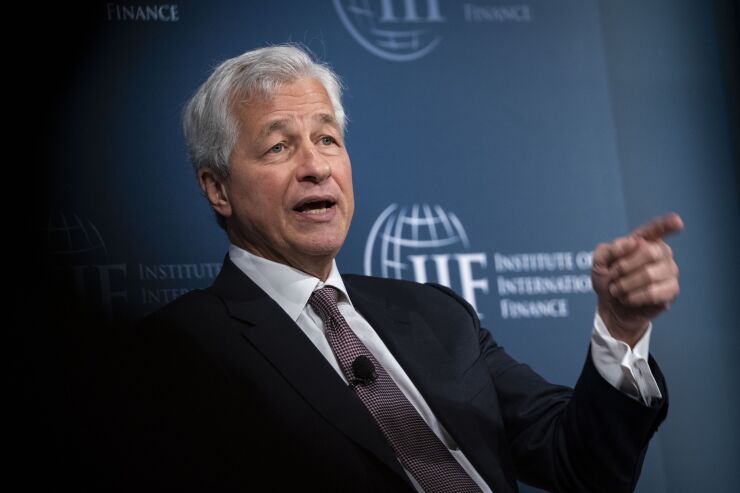JPMorgan Chase is a big global bank, but unlike some of its rivals, has no retail presence in markets outside of the U.S. That will change later this year with the launch of a digital consumer bank in the United Kingdom.
Buoyed by its vast digital capabilities and limited by how much it can grow in the U.S. due to federal caps on market share, the largest bank in the nation is looking across the pond to expand its consumer banking business. If the venture is successful, the Chase retail brand could eventually be rolled out in other parts of the world.
The New York-based company, which has been doing commercial and investment banking in the U.K. for years, took the first step toward building a digital bank there last week, when it announced a

“Think of it as a long-term play,” Chair and CEO Jamie Dimon said last week at an industry conference, referring to the company’s decision to offer retail banking services in the U.K. “If it works, then we’ll think about other things we could do with that.”
JPMorgan Chase has historically focused its retail efforts solely within the United States, where it continues to expand its reach. It is in the midst of a years-long strategy to add 400 branches in 20 markets and by mid-July, it expects to have at least one branch in each of the lower 48 states.
The shift overseas, meanwhile, presents minimal risk with potentially big rewards, analysts say. The company has the necessary technology platforms to accommodate scores of additional users, and the more customers it has using digital services, the more money it can make without meaningfully increasing expenses, analysts said.
Other factors make the timing good for JPMorgan Chase to test the waters. The pandemic has made consumers more comfortable using digital banking channels and with interest rates expected to stay low for at least another couple of years, customer acquisition — through mergers or expansion — is crucial for driving profitability, observers said.
“The thinking is, ‘If we can start generating revenues in the U.K. without a huge branch network, let’s give it a try,’” Piper Sandler analyst Jeffery Harte said. “If it doesn’t work, they might lose a little bit of money on it, but I’m not sure it would be noticed in the financial results. The pandemic pulled digital adoption ahead by years — so much further ahead, it’s more reasonable to think you can do this now.”
At JPMorgan, active mobile customers increased by 9% year over year to 42 million people, while branch transactions were down by double digits.
Other banks are seeing similar trends. According to a survey from S&P Global Market Intelligence, nearly 52% of consumers say they are visiting branches less frequently since the pandemic began and, of those respondents, more than 65% said they are using mobile apps more often.
“I don’t think you’re going to put the genie back in the bottle,” Fitch Ratings analyst Christopher Wolfe said.
JPMorgan Chase seems to be tapping into that growing preference for mobile banking, Harte said.
“I think for JPMorgan, it’s more of ‘Can we take this retail bank presence of ours and generate profits internationally by going digital?’” Harte said. “Which you couldn’t do two or three years ago because digital banking wasn’t as widely adopted. It’s a much more viable option now than it was before.”
JPMorgan Chase is not the first big bank to offer a digital consumer bank in the U.K. — Goldman Sachs’ retail banking arm, Marcus, has been offering online savings accounts there since 2018.

JPMorgan Chase declined to comment on its U.K. strategy, but it’s decision to launch a digital consumer bank in that market comes at a time when other big banks are retreating from certain international regions in order to double-down in markets and segments where they think they can achieve greater scale.
HSBC, which has pivoted its focus to wealth management, has found buyers for its mass-market retail franchises in both
Despite retreating in some areas, all three still have massive international operations. HSBC provides retail banking in 33 markets, BBVA has substantial presence in Europe and Latin America and Citi operates business lines in nearly 100 markets across the globe.
The difference in strategy comes down to the fact that JPMorgan Chase already has reached a level of scale in the U.S. that makes it easier, and less risky, to seek growth internationally, some say.
“I think it’s an opportunity to complete the continuum and see if they can replicate some of the success they’ve had in the U.S. market by cross-selling products across that continuum,” analyst Susan Roth Katzke of Credit Suisse said. “And cross-selling is not a dirty word. It’s the way to make money.”
In a recent Credit Suisse report, Roth Katzke and other analysts say that scale in the banking industry is realized when two things happen: a bank “has pricing power and above-average profitability supported by low and declining unit operating costs and” and when it has “outside capacity and willingness to invest in technology and spend in support of marketing and branding.”
Achieving scale matters when it comes to sustainable returns and share prices, they said.
“To be sure, we are not suggesting that bigger is better,” the analysts wrote. “We do conclude that the realization of scale economies … factors heavily into banks’ sustainable growth and return prospects.”
For JPMorgan Chase, moving retail into the U.K. is a way “to leverage a lot of what they’ve learned from their digital capabilities in the U.S. and attempt to grow in another part of the world,” Fitch Ratings analyst Bain Rumohr said.
“What they’ve built is certainly compelling and formidable,” Rumohr said. “If they are able to replicate that in the U.K., it would be an impressive feat.”





